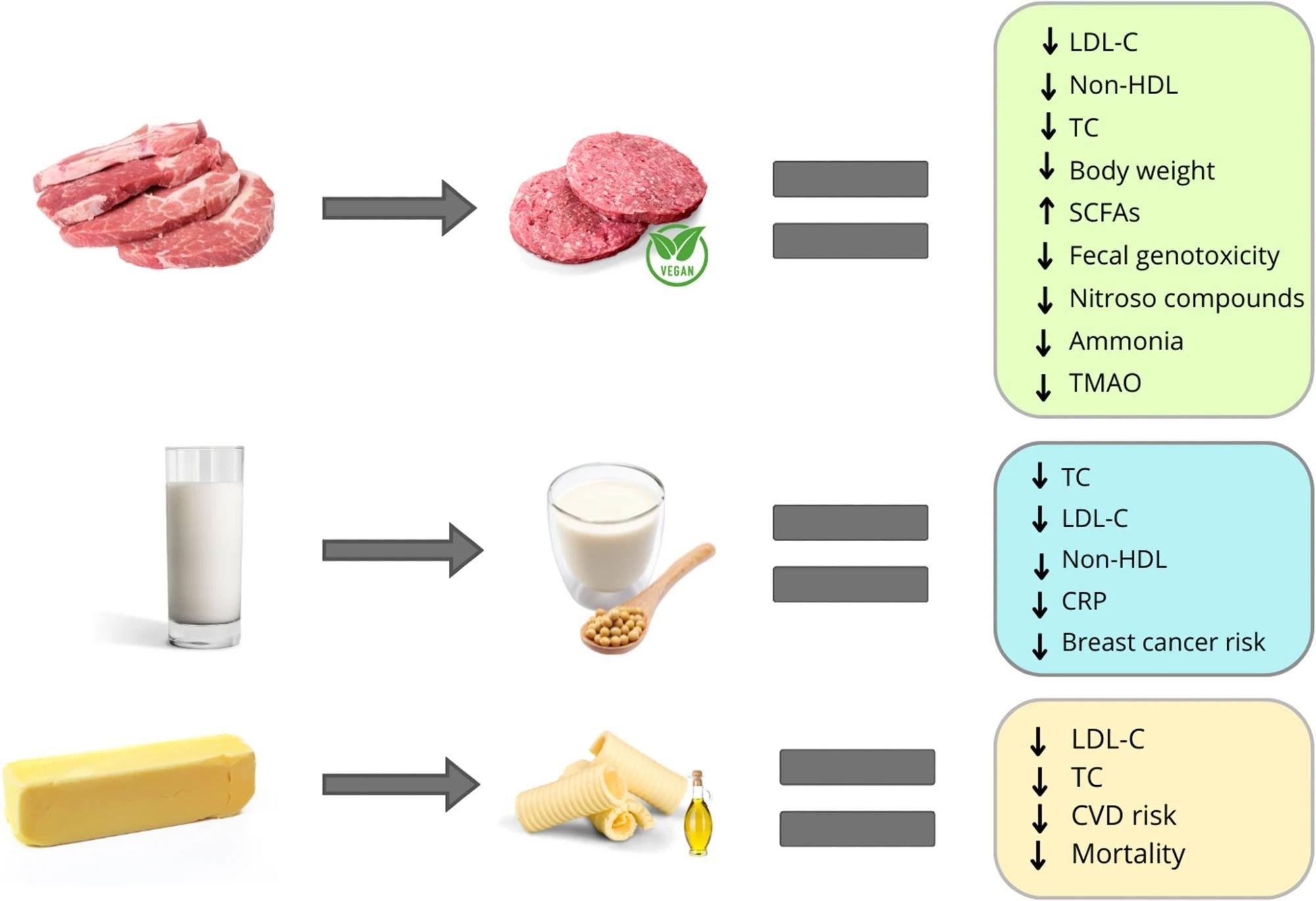A new review challenges assumptions about ultra-processed foods, finding that plant-based versions, such as soymilk, meat analogs, and soft margarines, may lower cholesterol and reduce disease risk when used as replacements for unprocessed animal foods.

Review: Ultra-processed Plant Foods: Are They Worse than their Unprocessed Animal-Based Counterparts? Image Credit: DronG / Shutterstock
Given the attention being paid to the health risks and benefits of unprocessed versus processed foods, there is a need for a narrative review of this area. A recent narrative review published in the journal Current Nutrition Reports examines how unprocessed animal foods compare with ultra-processed plant foods in terms of their impact on cardiometabolic risk, chronic disease, and mortality.
Introduction
The NOVA classification of foods has four groups: unprocessed/minimally processed foods, culinary ingredients, processed foods, and ultra-processed foods (UPFs). UPFs may be animal- or plant-based.
UPFs make up a major chunk of the modern diet. These are industrially made foods derived from the breakdown of whole foods, recombined with additives and processing aids to create new products offered as alternatives to foods or meals in other NOVA categories. UPFs are linked to cardiometabolic disease with obesity and a higher risk of death.
The UPF category has been criticized as a catch-all for products with widely varying health impacts. For instance, processed meats are UPFs with high sodium and nitrate content, high saturated fat content, and high cholesterol.
Conversely, mycoprotein-based UPFs are protein-rich but also high in fiber, low in saturated fat, and cholesterol-free. Mycoprotein is a product derived from the fermentation of fungal mycelia.

Health effects of substituting unprocessed animal foods with ultra-processed plant-based alternatives. Replacing dairy milk with soymilk leads to reduced levels of TC, LDL-C, and CRP, and it is associated with a lower risk of breast cancer. Substituting meat with plant-based analogs lowers TC, LDL-C, body weight, fecal genotoxicity, nitroso compounds, circulating TMAO, and ammonia, and augments the excretion of SCFAs. Replacing butter with margarine leads to a reduction in TC, LDL-C, CVD risk, and mortality. Abbreviations: Low-density lipoprotein cholesterol, LDL-C; non-high-density-lipoprotein cholesterol, non-HDL; total cholesterol, TC; short-chain fatty acids, SCFAs; trimethylamine oxide, TMAO; C-reactive protein, CRP; cardiovascular disease, CVD
Plant-based UPFs
Plant-based UPFs are popular due to rising demand for more sustainable and healthy foods, as well as ethical concerns among some consumers. They include plant milks, meat analogs, and margarine. These are cholesterol- and heme iron-free, contain less saturated fat, but also have lower levels of sulfur and branched-chain amino acids. They also contain dietary fiber, lacking in animal-based foods.
For instance, plant milks are often classified as UPFs. These are made from grains, pseudocereals, seeds, nuts, or even tubers, soaked in water and then homogenized. Additives are often present, including fortification with vitamins, stabilizers, acidity regulators, emulsifiers, added sugars and vegetable oils, added fiber or plant protein isolates, and salt or other flavorings.
As a result, about 84% of all plant milks are considered UPFs, 14% are processed, and only 2% are minimally processed. The UPF tag for such plant-based foods marks them as less healthy than unprocessed animal-based foods and prevents them from being more widely consumed.
One small randomized trial found that oat milk lowered total and LDL cholesterol within groups, though not significantly compared with cow’s milk, emphasizing the product-specific variability of plant milks.
Plant-based meat analogs are available as burgers, mincemeat, faux chicken, and soy deli slices. A Spanish market audit found that most plant-based meat alternatives available on supermarket shelves were ultra-processed, highlighting product availability rather than actual population consumption.
Margarine is the product of partial hydrogenation of vegetable oil and contains trans fatty acids. These constituents push up cardiovascular risk and overall mortality. Therefore, the partially hydrogenated oils were declared unsafe in 2015. In the United States, the FDA’s ban on partially hydrogenated oils took full effect in 2018.
The newer soft margarine is produced from non-hydrogenated vegetable oils, mostly those rich in PUFAs, which are associated with anti-inflammatory lipid effects rather than being directly termed antioxidant or anti-inflammatory compounds.
Benefits of plant-based UPFs
Undoubtedly, plant-based foods that have undergone minimal processing are the healthiest, with the best health outcomes. Yet some research indicates that substituting soymilk for dairy milk decreases lipid-related cardiovascular disease risk factors and reduces breast cancer risk. Replacing cow’s milk with soymilk reduced non-HDL-C, LDL-C, blood pressure, and CRP, with no effect modification by added sugars; sweetened soymilk and cow’s milk had similar median sugar content. Other studies indicate a reduction in type 2 diabetes, stomach and breast cancer, and osteoporosis risk.
In the Adventist Health Study-2, replacing one serving of cow’s milk with soymilk was associated with a lower risk of breast cancer.
In large European cohorts such as EPIC, plant-based alternatives have shown mixed associations, with no clear link between their consumption and reduced multimorbidity, highlighting that benefits may depend on substitution context and product composition.
The use of plant-based meat analogs is linked to reduced total and low-density lipoprotein (LDL) cholesterol and body weight. Their use is linked to lower levels of ammonia in the blood, as well as of trimethylamine-N-oxide (TMAO). Elevated TMAO levels are due to bacterial activity in animal-based foods and are linked to cardiometabolic disease risk.
Replacing red meat with plant-based analogs such as Beyond Meat has been shown in randomized crossover trials (e.g., SWAP-MEAT) to lower LDL-C, body weight, and TMAO. Other UPFs based on plant proteins, including soy, pea, and gluten protein analogs, are also promising for replacing animal-based foods, reducing total and LDL cholesterol, and increasing dietary fiber. The Portfolio Diet, which combines soy protein foods with nuts, viscous fiber, and plant sterols, has achieved LDL-C reductions comparable to those seen with statin therapy.
The use of soft margarine instead of butter brings down total and LDL cholesterol, and butter-to-margarine substitution has been associated with lower cardiovascular disease events and mortality. However, the review notes that non-lipid endpoints such as inflammatory or endothelial markers show less consistent improvement.
Why these benefits?
The healthful effects of these plant-based UPFs might be explained by their lower concentrations of essential amino acids, which are enriched in animal proteins. These include branched-chain amino acids, methionine, and lysine, which at higher levels induce metabolic dysfunction.
Animal foods contain cholesterol and much more saturated fat than most plant foods, elevating the risk of atherosclerosis and insulin resistance, and inducing inflammation. Besides the absence of these substances, PUFAs in plant foods add to the benefits.
Plant foods also contain dietary fiber, unlike animal foods, which can lead to the formation of short-chain fatty acids with anti-inflammatory effects and may reduce precancerous potential. The added thickening and binding agents may also reduce cholesterol absorption and improve blood glucose regulation.
Heme iron in animal meat increases the risk of cancer, type 2 diabetes, and fatal cardiovascular disease. Leghemoglobin, derived from modified yeast, mimics the characteristics of heme and is used in many plant-based meat analogs.
Other mechanisms include the lower levels of the atherogenic trimethylamine-N-oxide (TMAO). Bioavailable estrogens found in dairy milk are absent in plant milks, reducing the oncogenic potential.
Conclusions
Plant-based UPFs are less healthful than whole plant foods. However, they may offer better cardiometabolic outcomes than unprocessed animal-based foods, particularly when used as substitutions. They can serve as transitional tools in shifting from a meat- and plant-based omnivorous diet to a plant-based diet. “Public health guidance should reflect these nuances to support realistic, health-promoting transitions.”
Future studies should focus on highlighting differences among various UPFs and other foods.